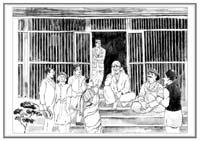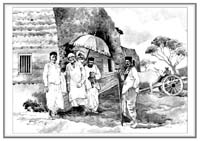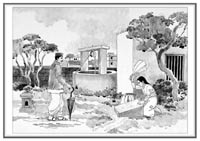| |
|
|

|
|
As Bhagavan Sri Sathya
Sai Baba often reminds us, the main
purpose of the Sai Avatar is to draw
the attention of mankind to the Divine
Oneness that permeates Creation. The
ancients knew this Truth but then,
mankind also tends to quickly forget
the Truth. And that is why, from time
to time, the Lord has to incarnate,
as Krishna explained to Arjuna. In
the Shirdi Avatar, the Lord adopted
a very novel strategy to promote the
Spirit of Oneness. Baba conducted
Himself in such a way that the Muslims
thought He was a Muslim while the
Hindus believed He was a Hindu. In
the process, Baba drew both communities
to Him. Thus, in 1897, Gopalrao Gund,
got the idea of celebrating the Muslim
festival of Urs. Together with other
Hindu devotees like Tatya Patil and
Madhav Rao Shinde (Shyama), Gund got
Baba's approval to celebrate the festival.
Thereafter, the annual celebration
of the Urs festival became a routine
affair. Interestingly, it was celebrated
on Rama Navami day, and naturally,
it was the Muslims who took the leading
part. From 1912, the Urs was combined
with Rama Navami celebrations. In
this manner, in many different ways,
Baba drew not only Hindus and Muslims
to Him, but also the Parsis, and even
the English, who then ruled India.
|
|
| OCTOBER 2003 |
 |
|
|
|
|
In the beginning,
the Masjid was Baba's residence. Later,
He adopted one more location, the
Chavadi. In fact, one night He slept
in the Masjid, and the next night
He spent in the Chavadi. This alternation
went on till the very end. From 1909,
devotees began to offer regular worship
to Baba in the Chavadi. The distance
between the Masjid and the Chavadi
was small; yet, Baba's journey from
one residence to the other was quite
an event. The book Sai Sat Charita
describes in great detail Baba going
in procession from the Masjid to the
Chavadi. Baba would walk accompanied
by Tatya Patil and Mhalsapathi. While
Patil walked on the right holding
a lantern, Mhalsapathi on the left
would be holding the hem of Baba's
garment. Nana Nimonkar held the umbrella.
In the procession would be Bhajan
singers, and the crowd would raise
the name of the Lord. There was a
spot before the Chavadi, where Baba
stood for a long time giving Darshan,
His face glowing with extra-ordinary
lustre. On reaching the Chavadi, Aarathi
would be offered. The painting above
is based on a famous photo taken during
one of Baba's movement from one residence
to the other.
|
|
| NOVEMBER 2003 |
 |
|
|
|
|
Lakshmibai Shinde
she was one of the very few ladies
who was privileged to serve Baba.
To Lakshmibai fell the honour of bringing
food [Bhakri and milk] daily to Baba,
at the appointed time. Others too
would send food, but Baba would not
touch any of it till Lakshmibai's
offering came; He would patiently
wait till then; such was His Love
for Lakshmibai. When the end drew
near, Baba called Lakshmibai to His
side and affectionately gave her nine
rupees. Lakshmibai was quite well
to do. Why then did Baba give her
money, and what was the significance?
Lakshmibai did not understand but
faithfully treasured the nine coins
till the end of her life and never
gave them away. Our beloved Swami
has explained that Shirdi Baba gave
Lakshmibai nine rupees to remind her
that there are nine paths to reach
God, the Navarasa Bhakti Marga of
the scriptures. As Swami often recalls,
these are Sravanam [listening to His
Glory], Keertanam [singing His Glory],
Vishnu Smaranam [chanting His Name],
Pada Sevanam [service to the Lotus
Feet], Archanam [ritual worship],
Vandanam [offering salutations], Dasyam
[being the servant of the Lord], Sakhyam
[being the friend of the Lord], and
Atma Nivedanam [surrendering to the
Lord].
|
|
| DECEMBER 2003 |
 |
|
|
|
|
<<
back
|
|
|
|
|